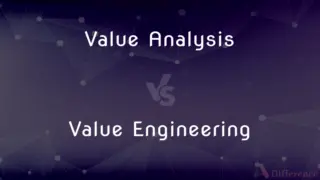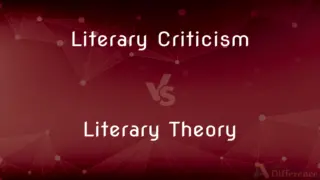Java vs. Core Java — What's the Difference?
Edited by Tayyaba Rehman — By Fiza Rafique — Published on December 1, 2023
Java refers to a broad programming language and platform, while Core Java denotes the fundamental parts and standard libraries of the Java language.

Difference Between Java and Core Java
Table of Contents
ADVERTISEMENT
Key Differences
Java is a general-purpose, object-oriented programming language initially developed by Sun Microsystems in the mid-1990s. Its "write once, run anywhere" philosophy means that code written in Java can run on any device with a Java Virtual Machine (JVM). On the other hand, Core Java refers specifically to the basic and fundamental parts of the Java language, encompassing its standard libraries and foundational concepts.
Java, over the years, has grown to include a vast ecosystem with various APIs, tools, frameworks, and technologies, making it suitable for web, desktop, mobile, and enterprise applications. Core Java remains the backbone of this ecosystem, providing the foundational building blocks upon which other components and frameworks are built.
While Java, as a broader term, covers both standard and enterprise editions, including frameworks like Spring and Hibernate, Core Java stays confined to the standard libraries and core functionalities. This distinction is vital for developers, as Core Java forms the base knowledge expected of any Java developer, irrespective of the specific domain or specialization.
A developer starting with Java would first learn Core Java, mastering the fundamental concepts like loops, data types, and object-oriented principles. After a firm grasp of Core Java, they might then proceed to explore the broader Java ecosystem, diving into specialized areas such as Java EE for enterprise applications or JavaFX for graphical user interfaces.
Comparison Chart
Scope
Entire language, platform, and ecosystem.
Fundamental parts and standard libraries of Java.
ADVERTISEMENT
Components
Includes standard and enterprise editions, frameworks.
Confined to the standard libraries and core functions.
Usage
Web, desktop, mobile, enterprise applications.
Base knowledge for all Java-related developments.
Learning Progression
Learned after understanding Core Java fundamentals.
Typically the starting point for learning Java.
Inclusion
Covers both Core Java and additional components.
Subset of Java.
Compare with Definitions
Java
A platform that includes a JVM to execute compiled code.
Java applications can run on any device with a JVM.
Core Java
The foundational and basic components of the Java programming language.
Before diving into advanced topics, programmers should master Core Java.
Java
A general-purpose, object-oriented programming language.
Java is widely used in web application development.
Core Java
The standard libraries and functionalities in Java.
Core Java concepts form the backbone of all Java applications.
Java
A language known for its "write once, run anywhere" philosophy.
Developers prefer Java for its cross-platform capabilities.
Core Java
The subset of Java that excludes advanced APIs and frameworks.
Core Java is essential for understanding advanced Java frameworks.
Java
A technology ecosystem with a variety of tools, frameworks, and libraries.
Java's extensive ecosystem supports various application domains.
Core Java
The part of Java knowledge expected of any Java developer.
Job interviews for Java roles often test Core Java understanding.
Java
A language that has both standard and enterprise editions.
Java SE is used for standalone applications while Java EE supports enterprise solutions.
Core Java
The elements covered in the standard edition of Java without enterprise features.
Core Java encompasses the concepts taught in beginner Java courses.
Java
Brewed coffee.
Java
A blend of coffee imported from the island of Java.
Java
Coffee in general.
Java
A dance popular in France in the early 20th century.
Java
One of the islands of the Malay Archipelago belonging to the Netherlands.
Java
Java coffee, a kind of coffee brought from Java.
Java
An object-oriented computer programming language, derived largely from C++, used widely for design and display of web pages on the world-wide web. It is an interpreted language, and has been suggested as a platform-independent code to allow execution of the same progam under multiple operating systems without recompiling. The language is still (1997) under active development, and is evolving.
Java
An island in Indonesia south of Borneo; one of the world's most densely populated regions
Java
A beverage consisting of an infusion of ground coffee beans;
He ordered a cup of coffee
Java
A simple platform-independent object-oriented programming language used for writing applets that are downloaded from the World Wide Web by a client and run on the client's machine
Common Curiosities
What does "write once, run anywhere" mean in Java?
It means Java code can be written once and run on any device with a JVM, ensuring platform independence.
Is Core Java different from Java?
Core Java is a subset of Java, focusing on its foundational elements, whereas Java includes the broader ecosystem.
What is Java?
Java is a general-purpose, object-oriented programming language and platform known for its cross-platform capabilities.
Why is Core Java important?
Core Java provides the base knowledge essential for all Java-related developments and is a prerequisite to understanding advanced Java topics.
What encompasses Core Java?
Core Java includes the foundational components, standard libraries, and basic concepts of the Java language.
Does Java only pertain to software development?
While primarily a programming language, Java's broad ecosystem also includes tools, frameworks, and platforms for various applications.
Do I need a JVM to run Core Java programs?
Yes, all Java programs, including those written using Core Java, require a JVM to execute.
Can I build web applications with just Core Java knowledge?
While Core Java provides foundational knowledge, building web applications typically requires understanding additional Java frameworks and libraries.
Are frameworks like Spring and Hibernate part of Core Java?
No, they are advanced frameworks in the Java ecosystem and are not part of Core Java.
Is the Java Virtual Machine (JVM) part of Core Java?
The JVM is part of the broader Java platform, which runs compiled Java code. Core Java concepts are executed on the JVM.
How can I start learning Java?
Beginners should start with Core Java to grasp the foundational concepts before moving to advanced topics.
Are Java's standard libraries part of Core Java?
Yes, the standard libraries are a fundamental part of Core Java.
Are Java and Core Java the same in terms of syntax and semantics?
Yes, Core Java follows the same syntax and semantics as Java, but it focuses only on the foundational elements.
Do all Java developers need to know Core Java?
Yes, Core Java forms the fundamental knowledge base for any Java developer.
Is Core Java enough for building standalone applications?
Yes, standalone applications can be built using Core Java, but for specific functionalities, additional libraries might be needed.
Share Your Discovery

Previous Comparison
Value Analysis vs. Value Engineering
Next Comparison
Literary Criticism vs. Literary TheoryAuthor Spotlight
Written by
Fiza RafiqueFiza Rafique is a skilled content writer at AskDifference.com, where she meticulously refines and enhances written pieces. Drawing from her vast editorial expertise, Fiza ensures clarity, accuracy, and precision in every article. Passionate about language, she continually seeks to elevate the quality of content for readers worldwide.
Edited by
Tayyaba RehmanTayyaba Rehman is a distinguished writer, currently serving as a primary contributor to askdifference.com. As a researcher in semantics and etymology, Tayyaba's passion for the complexity of languages and their distinctions has found a perfect home on the platform. Tayyaba delves into the intricacies of language, distinguishing between commonly confused words and phrases, thereby providing clarity for readers worldwide.













































